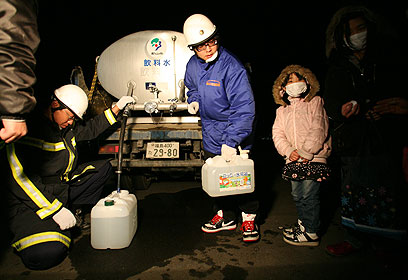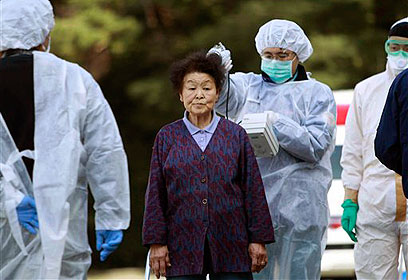Despite the horror-film imagery surrounding them, the citizens in line kept calm. As the men armed with gas masks and special goggles moved from tent to tent, they found a number of people they suspected have been subjected to radiation.
More than 2,000 people have passed through the sanitation facility in Koriyama since authorities announced a massive evacuation from the areas near Fukushima power plant. The cooling systems of its nuclear reactors were damaged during the 8.9 magnitude quake that struck Japan a few days ago, sparking fears of contamination.
So far, 22 people have been found to have been exposed to radiation, but authorities suspect the number is actually around 190.
An explosion blew the roof off the No. 1 reactor building on Saturday, and on Monday morning a blast at the No. 3 reactor injured at least 11, according to Tokyo Electric Power Co, which runs the plant.

The line for water (Photo: Boaz Arad)
Officials confirmed on Sunday that three nuclear reactors north of Tokyo were at risk of overheating, raising fears of an uncontrolled radiation leak.
Engineers worked desperately to cool the fuel rods. If they fail, the containers that house the core could melt, or even explode, releasing radioactive material into the atmosphere.

Testing for contamination (Photo: AP)
'A thin powder'
The massive earthquake that struck Japan on Friday has so far claimed the lives of some 10,000 people and led to the evacuation of around 300,000 from their homes.
Millions also remain without power and water, and Japan's prime minister has called it the worst disaster since World War II, when two atom bombs were dropped on the country. Reconstruction has been estimated at tens of billions of dollars.
But for some, the biggest fear remains radiation contamination from the heating reactors. "It looks like thin powder," one of the men working at the decontamination center explained. "It sticks to clothing, skin, hair, anywhere." The contaminated area is just 30 km from the center, he added.
Some of the civilians waiting to receive news of their condition appeared extremely concerned, and some were biting their nails from worry. But mostly they appeared tired, worn out from nights spent in their cars. Some had their dogs with them, who were also undergoing tests.
Prime Minister Naoto Kan said the situation at the 40-year-old Fukushima nuclear plant remained worrisome and that the authorities were doing their utmost to stop damage from spreading.
"We have rescued over 15,000 people and we are working to support them and others. We will do our utmost in rescue efforts again today," he said.
Just down the street from the Koriyama decontamination center, hundreds of people were sleeping on mats in a gym. The few possessions they had managed to gather in their flight from home were piled up in cardboard boxes. Outside, firemen handed out drinking water.
"Of course I'm afraid to be here," says a woman dragging her share of the water into the gym in a huge plastic container. "But where can we go? Our homes no longer exist."
Reuters contributed to this report
- Follow Ynetnews on Facebook


















